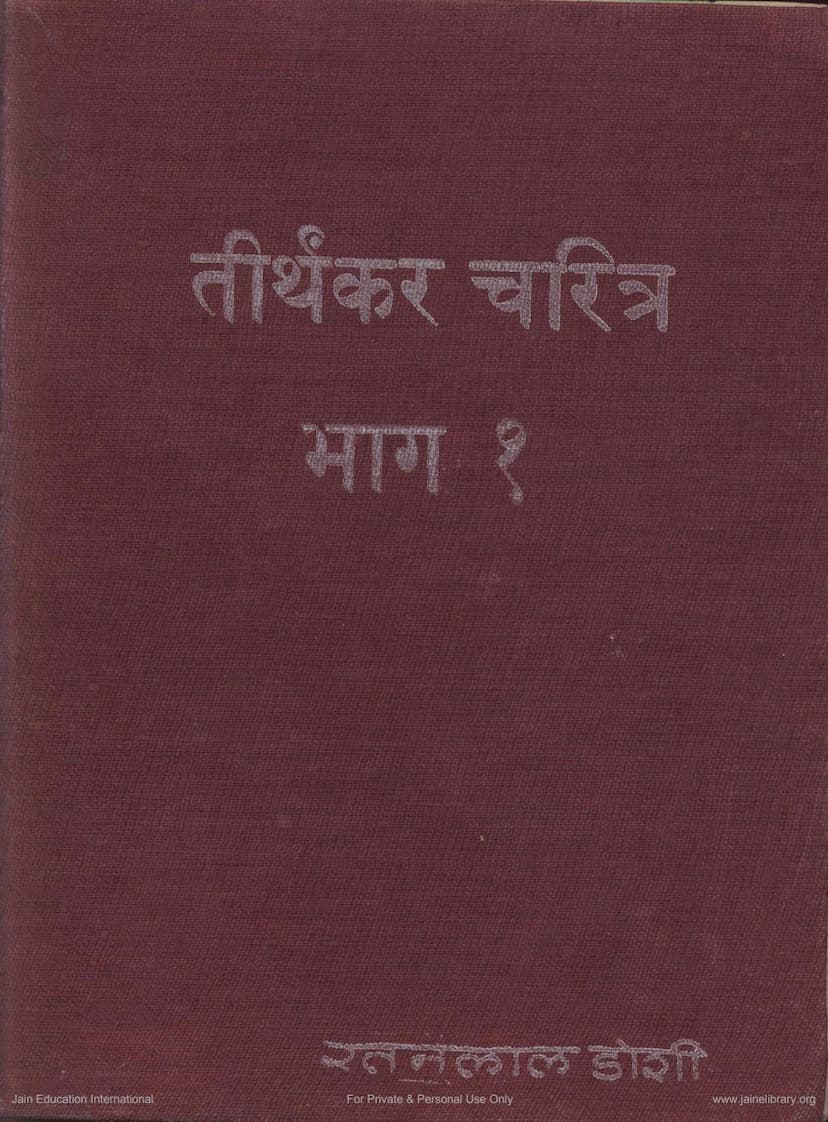Tirthankar Charitra Part 1
Added to library: September 2, 2025

Summary
This document is the first part of "Tirthankar Charitra" by Ratanlal Doshi, published by Akhil Bharatiya Sadhumargi Jain Sanskruti Rakshak Sangh. It aims to provide a detailed account of the lives of the Tirthankaras, their past lives, and their spiritual journeys.
The author acknowledges that there is a lack of systematically compiled Tirthankar biographies in their society, and this work attempts to fill that gap, drawing heavily from Shrimad Hemchandracharya's "Trishashthishalakapurusha Charitra," as well as other Jain scriptures, incidental mentions in Agamas, and occasional Doha-Chaupai. The author also notes that where differences exist between textual sources and Agamic injunctions, they have prioritized the Agamic ones, but admits to possible deviations due to usability factors.
The book covers the lives of 19 Tirthankaras, 8 Chakravartis, and 7 Vasudevas, Baladevas, and Prativasudevas, along with many other related figures. The author plans to continue this series with further volumes.
The summary highlights the following key aspects of the text, focusing on the life of Lord Rishabhdev, the first Tirthankara:
Lord Rishabhdev's Previous Lives:
- Dhanya Sarthavaha: Describes a wealthy merchant, Dhanya, known for his generosity and adherence to strict Jain vows, including not consuming food or water that has been specifically prepared for them or water with life. His spiritual journey begins with an encounter with Acharya Dharmaghosh.
- Yugalika Birth in Uttarakuru: Details a pleasant life in Uttarakuru, a land of abundance and simplicity, where people live for a long period without many worldly attachments.
- Dev and Vidyadhar Births: Mentions his existence as a celestial being in Saudharma heaven and later as Mahabal, a prince of Vidyadhar kings, where he contemplates the impurity of the body and the transient nature of life.
Lord Rishabhdev's Human Life (as the first Tirthankara):
- The Preaching of Swayambuddha: Recounts the philosophical debates and the eventual enlightenment of Swayambuddha.
- Adharmies' Disputes: Details arguments with those who held atheistic or materialistic views.
- Taking Initiation and Ascending to Heaven: Describes the process of renunciation and the subsequent celestial existence.
- Lalitaanga Dev's Departure: Describes his life as the celestial being Lalitanga, his attachment to the celestial maiden Svayaprabha, and the grief he experiences upon her death.
- Nirnamika's Story: Narrates the tale of Nirnamika, a woman of unfortunate circumstances, highlighting the suffering in the world.
- The Tirthankara's Birth and Upbringing: Describes the auspicious birth of Lord Rishabhdev, the purification rituals performed by directional goddesses, the arrival of Indra and other celestial beings for the celebration, and the divine manifestations surrounding his birth.
- Vajrangabali's Greatness: Mentions the physical attributes and divine marks of the Tirthankara.
- King Bharat's Digvijaya: Details the conquests and establishment of the empire by Chakravarti Bharat.
- Bahuabli's Renunciation: Focuses on the momentous events leading to Bahubali's renunciation and his eventual attainment of omniscience.
- Lord Rishabhdev's Teachings: Provides insights into the philosophical discourse and ethical principles imparted by the Lord.
- Bharat's Eventual Enlightenment: Describes Bharat's spiritual journey after renouncing his kingdom.
- The Birth of Rishabhdevji's Sons and Daughters: Introduces Bharat, Bahubali, Brahmi, and Sundari.
- The Beginning of Karma-Bhumi and State Establishment: Explains how Lord Rishabhdev laid the foundation for societal structures, introduced arts and sciences, and established kingship.
- Lord Rishabhdev's Renunciation and Divine Awakening: Describes the Lord's detachment from worldly pleasures and the divine calling towards spiritual liberation.
- Vardhan-Daan: Details the act of immense charity performed by the Lord.
- Initiation: Narrates the sacred ceremony of renunciation.
- First Defeat of Bharat: Chronicles an event where Bharat, despite his power, faced a setback.
- The Story of Bahubali's Austere Penance: Highlights Bahubali's intense spiritual discipline.
- Enlightenment of Bahubali's Sisters: Mentions the spiritual attainment of Bahubali's sisters.
- Lord Rishabhdev's Enlightenment and Nirvana: Concludes with the ultimate spiritual realization and liberation of Lord Rishabhdev.
- The Justification of the Goldsmith's Story: Includes a philosophical discussion on detachment and perception, with the anecdote of the goldsmith and the oil pot.
The text also contains summaries of the lives of subsequent Tirthankaras such as Ajitnath, Sambhavnath, Abhinandanath, Sumatinath, Padmaprabh, Suparshvanath, Chandprabh, Suvidhinath, Shitalnath, Shreyansnath, Vasupujya, Vimalnath, Anantnath, Dharmnath, Shantnath, Kunthunath, Aranath, Mallinath, Munisuvrat, Naminath, Arishtanemi, Parshvanath, and Mahavir Swami, along with brief mentions of Chakravartis and Vasudevas. The appendix provides a table with details of all Tirthankaras, their previous births, parents, birth and death dates, celestial abodes, lifespans, initiation, enlightenment, and congregations.